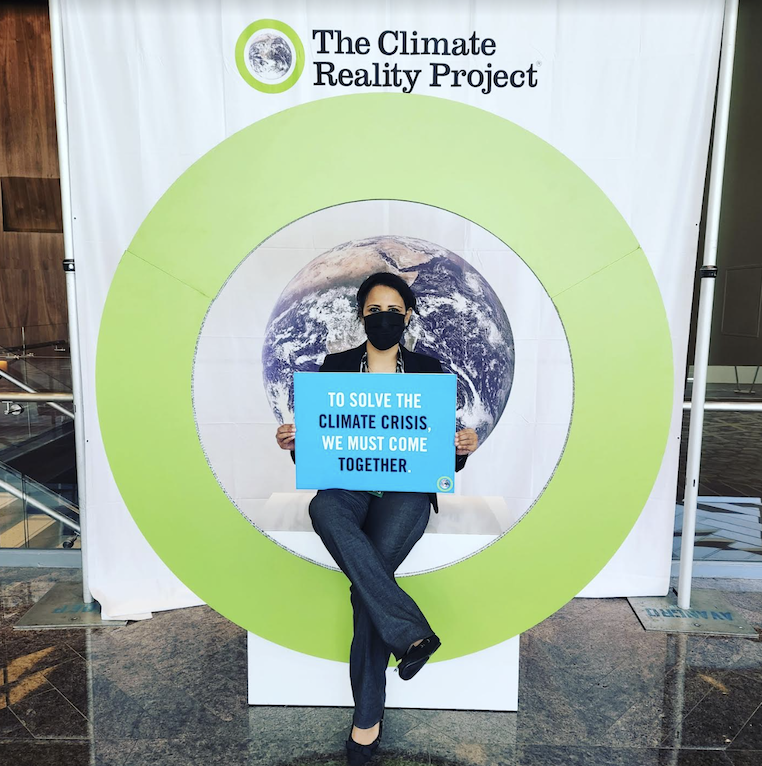
The Climate Crisis & Human Rights
By Nesha Abiraj
It is an understood global reality that women and girls are facing the harshest impacts of the climate crisis. Yet we seldom hear advocates at the frontlines of the climate crisis, speaking to the impact on human rights. Thankfully, this is changing. In January of 2023, I was invited by the North County Climate Change Alliance in California to present on climate justice and human rights. A few days prior to the presentation, the organizers asked if they could use my Sahiyo Voices Video from 2021 to introduce me as a speaker. Elated, I immediately said yes. On the day of the presentation, my colleague and fellow Climate Reality Leader, delivered my introduction. He clearly identified and articulated the connection I was aiming to make: the intersectionality between the climate crisis and the exacerbation of human rights violations, including female genital cutting (FGC), and by extension the need for international climate justice.
People were beginning to understand just how much more was at stake, and I was hearing people speak about FGC and child marriage in spaces where I had not otherwise expected to hear it. People came up to me expressing their shock and deep concern that these harmful practices even existed in the regions and/or communities they lived in. There were people learning about FGC for the first time, and some expressed a desire to learn more so that they could integrate this and other human rights violations into their work on the climate crisis.
The UN Secretary General in his 2022 remarks stated that humanity now faces a “collective suicide pact” on account of the climate crisis. According to UNICEF, as the climate crisis pushes more children and families into extreme poverty, 9 million more children may suffer from wasting, the most life-threatening form of malnutrition by the end of 2022. We are now in 2023. More than 200 million women and girls alive today have undergone FGC and more than 400 million girls are now more vulnerable to this harm because of the climate crisis. UNICEF projects that one billion children are at extremely high risk due to the impacts of the climate crisis.
In the face of such startling data, how can we not act?
Since learning about the climate crisis through training to become a Climate Reality Leader with the Climate Reality Project, as well as continued research, I have integrated the impacts of the climate crisis in my work to promote the protection of women and girls from harmful practices such as FGC. Additionally, recognizing the need for international law and policy to provide a pathway for justice, accountability, and a deterrent to slow the pace of the climate crisis, I have also become an advocate for climate justice with Stop Ecocide International, specifically advocating for ecocide to become the 5th International Crime Against Peace.
Simply put, laws geared towards environmental protection are woefully inadequate, and environmental crimes continue to occur at great costs to humanity because these crimes are treated with impunity. The people who are forced to bear the consequences of the climate crisis come from regions that are the lowest emitters of greenhouse gases. It is their lives that are being upended as a result of actions they had nothing to do with. That includes the women and girls who are now at a heightened risk of having FGC performed on them.
The impact of the climate crisis on human rights and the urgent need for climate justice must be made central to any climate related policy. If we proceed as is without integrating these impacts, we run the risk of leaving millions of women and girls behind and at severe risk of harm.
Women and girls are counting on us. You can help them by getting more involved in Sahiyo’s work as a volunteer or by signing on to Sahiyo’s petition to the United Nations. You can also support Sahiyo’s efforts by donating. These funds enable Sahiyo to support and train advocates, host educational webinars, and support survivors. In 2021 I was able to participate in the Voices project as an advocate at no cost to me. Two years later I continue to support making it possible for others to have the benefit of these educational and training opportunities at no cost. You too can do the same for someone else.
Nesha Abiraj is an International Human Rights Lawyer. She is currently serving in her second year as an Ambassador to Island States and vulnerable coastal regions on International Climate Justice and Human Rights with Island Innovation. She also serves as an Ambassador to Stop Ecocide International, an organisation seeking to make ecocide, which is broadly understood to mean largescale and systematic destruction of nature, the 5th International Crime against Peace. Nesha also serves as a member of the US National Coalition to end early, forced and child marriages and is a US Advisory Board Member to Sahiyo. She previously worked with Human Rights Watch, Save the Children and continues to serve as a Lead Advocate for UNICEF USA on international humanitarian response relating to key poverty focused issues impacting the lives of children living in humanitarian and developmental settings including conflict zones. She is also a Climate Reality Leader and a member of the Commonwealth Lawyers Association.